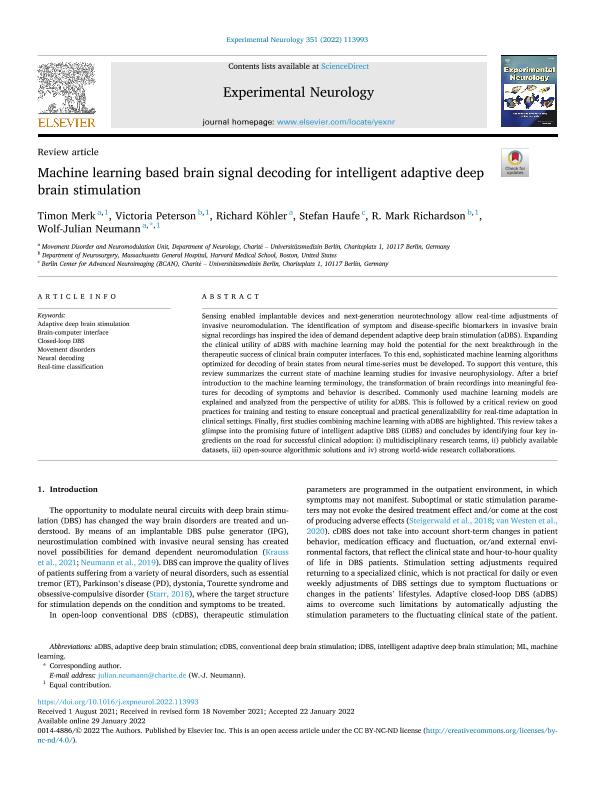Mostrar el registro sencillo del ítem
dc.contributor.author
Merk, Timon
dc.contributor.author
Peterson, Victoria

dc.contributor.author
Köhler, Richard
dc.contributor.author
Haufe, Stefan
dc.contributor.author
Richardson, R. Mark
dc.contributor.author
Neumann, Wolf Julian
dc.date.available
2023-09-20T16:11:21Z
dc.date.issued
2022-05
dc.identifier.citation
Merk, Timon; Peterson, Victoria; Köhler, Richard; Haufe, Stefan; Richardson, R. Mark; et al.; Machine learning based brain signal decoding for intelligent adaptive deep brain stimulation; Academic Press Inc Elsevier Science; Experimental Neurology; 351; 5-2022; 1-17
dc.identifier.issn
0014-4886
dc.identifier.uri
http://hdl.handle.net/11336/212352
dc.description.abstract
Sensing enabled implantable devices and next-generation neurotechnology allow real-time adjustments of invasive neuromodulation. The identification of symptom and disease-specific biomarkers in invasive brain signal recordings has inspired the idea of demand dependent adaptive deep brain stimulation (aDBS). Expanding the clinical utility of aDBS with machine learning may hold the potential for the next breakthrough in the therapeutic success of clinical brain computer interfaces. To this end, sophisticated machine learning algorithms optimized for decoding of brain states from neural time-series must be developed. To support this venture, this review summarizes the current state of machine learning studies for invasive neurophysiology. After a brief introduction to the machine learning terminology, the transformation of brain recordings into meaningful features for decoding of symptoms and behavior is described. Commonly used machine learning models are explained and analyzed from the perspective of utility for aDBS. This is followed by a critical review on good practices for training and testing to ensure conceptual and practical generalizability for real-time adaptation in clinical settings. Finally, first studies combining machine learning with aDBS are highlighted. This review takes a glimpse into the promising future of intelligent adaptive DBS (iDBS) and concludes by identifying four key ingredients on the road for successful clinical adoption: i) multidisciplinary research teams, ii) publicly available datasets, iii) open-source algorithmic solutions and iv) strong world-wide research collaborations.
dc.format
application/pdf
dc.language.iso
eng
dc.publisher
Academic Press Inc Elsevier Science

dc.rights
info:eu-repo/semantics/openAccess
dc.rights.uri
https://creativecommons.org/licenses/by-nc-nd/2.5/ar/
dc.subject
ADAPTIVE DEEP BRAIN STIMULATION
dc.subject
BRAIN-COMPUTER INTERFACE
dc.subject
CLOSED-LOOP DBS
dc.subject
MOVEMENT DISORDERS
dc.subject
NEURAL DECODING
dc.subject
REAL-TIME CLASSIFICATION
dc.subject.classification
Otras Ciencias de la Computación e Información

dc.subject.classification
Ciencias de la Computación e Información

dc.subject.classification
CIENCIAS NATURALES Y EXACTAS

dc.title
Machine learning based brain signal decoding for intelligent adaptive deep brain stimulation
dc.type
info:eu-repo/semantics/article
dc.type
info:ar-repo/semantics/artículo
dc.type
info:eu-repo/semantics/publishedVersion
dc.date.updated
2023-07-07T21:58:15Z
dc.journal.volume
351
dc.journal.pagination
1-17
dc.journal.pais
Estados Unidos

dc.description.fil
Fil: Merk, Timon. Charité – Universitätsmedizin Berlin; Alemania
dc.description.fil
Fil: Peterson, Victoria. Consejo Nacional de Investigaciones Científicas y Técnicas. Centro Científico Tecnológico Conicet - Santa Fe. Instituto de Matemática Aplicada del Litoral. Universidad Nacional del Litoral. Instituto de Matemática Aplicada del Litoral; Argentina. Harvard Medical School; Estados Unidos
dc.description.fil
Fil: Köhler, Richard. Charité – Universitätsmedizin Berlin; Alemania
dc.description.fil
Fil: Haufe, Stefan. Charité – Universitätsmedizin Berlin; Alemania
dc.description.fil
Fil: Richardson, R. Mark. Harvard Medical School; Estados Unidos
dc.description.fil
Fil: Neumann, Wolf Julian. Charité – Universitätsmedizin Berlin; Alemania
dc.journal.title
Experimental Neurology

dc.relation.alternativeid
info:eu-repo/semantics/altIdentifier/url/https://www.sciencedirect.com/science/article/pii/S0014488622000188
dc.relation.alternativeid
info:eu-repo/semantics/altIdentifier/doi/http://dx.doi.org/10.1016/j.expneurol.2022.113993
Archivos asociados
